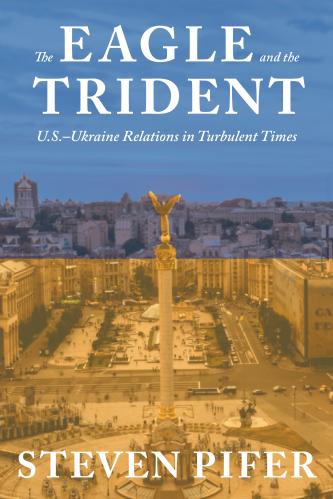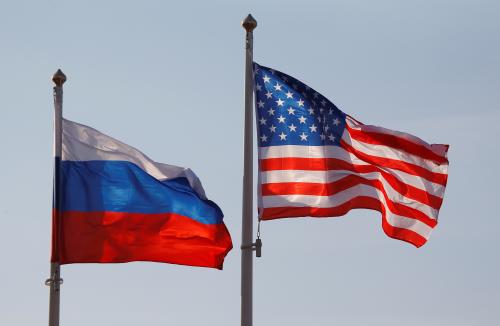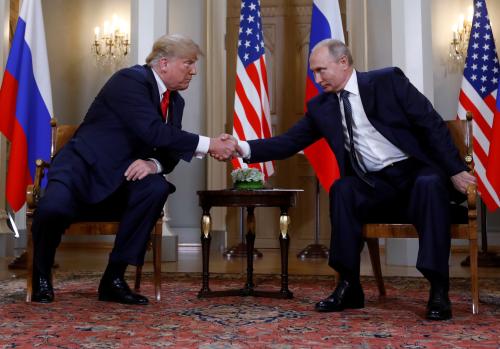Twenty-five years ago this week, the United States, Russia, and Ukraine signed the Trilateral Statement and Annex, in which Ukraine agreed to transfer its nuclear stockpile to Russia. In exchange, Ukraine received compensation for the value of the highly enriched uranium in the nuclear warheads, assistance in eliminating the strategic delivery systems on its territory, and security assurances from the United States and Russia. Later that year, the United States, Russia, and the United Kingdom signed the Budapest Memorandum on Security Assurances with Ukraine, guaranteeing respect for Ukraine’s borders, independence, and sovereignty, and promising to refrain from the threat or use of economic and military force.
In 1996, Ukraine sent the remainder of its nuclear warheads to Russia, completing the surrender of the country’s position as the third-largest nuclear power.
In 2014, Russia violated the terms of the Budapest Memorandum by using military force to seize the Crimean peninsula, and later by supporting a violent separatist movement in eastern Ukraine.
The response to Russia’s violation from the United States and other powers has been disturbingly weak. In addition to violating its commitments to Ukraine, commitments that were key to persuading Kyiv to give up the world’s third-largest arsenal, Russia has devalued security assurances as a nonproliferation tool for discouraging countries from acquiring nuclear weapons in the future. It is but one example of Moscow’s untrustworthiness in a fraying international system.
Budapest undermined
The Budapest Memorandum was aimed at keeping Ukraine safe from Russia’s hegemonic ambitions. Instead, today’s Ukraine is reeling from a simmering conflict in its eastern regions, an ever-growing population of almost 2 million internally-displaced persons (IDPs), and more recently, Russian brinkmanship and the breach of maritime law in the Sea of Azov. Some of the separatist fighters are Russian soldiers and all the fighters operate under Russian military leadership. When the United States and Ukraine invited Russia to participate in consultations, as the Memorandum stipulates if questions arise concerning a signatory’s commitments, Moscow declined.
The Kremlin has rationalized its actions in a number of ways, including claiming that Russia signed the Budapest Memorandum with the Ukrainian government that existed under President Leonid Kuchma, not the government that took power following Ukraine’s 2013-14 Maidan revolution. But international law considers international agreements binding to states, not merely binding to the administrations who negotiate them. A critical element of diplomacy is the expectation that agreements made with one government transfer over to future governments.
Russia has little incentive to change course. The international community—including the United States—has not done nearly enough to make Russia’s actions in Ukraine costly for Moscow. Both Minsk agreements—the first negotiated by Ukraine, Russia, the Organization for Security and Co-operation in Europe (OSCE), and separatist leaders; the second by Ukraine, Russia, Germany, and France—failed to broker peace. But the problem goes beyond the Minsk peace process, Ukraine’s slow economic and political reform, and the lack of sanctions success. When the Russians violated the Budapest Memorandum, they severely undermined the agreement’s security assurances, making the security assurance mechanism less useful for resolving future proliferation cases.
Global nonproliferation dangers
That recklessness is all the more dangerous at a time when South Asia, East Asia, the Middle East, and other regions are subject to uncontrollable nuclear breakout. When the Nonproliferation Treaty came into effect half a century ago, there were five nuclear armed nations: the United States, the USSR, the United Kingdom, France, and China. Today, with the addition of Israel, India, Pakistan, and North Korea, the total is nine.
Russia’s transgression sends a message to countries like North Korea and Iran that they have less reason to trust security assurances or the involvement of Russia in future nonproliferation negotiations or commitments. Perhaps these countries might also wonder why they should trust the United States or Europe, when each has refrained from extending harsher penalties to Russia.
To reinforce a commitment to nonproliferation, Washington must do more for Ukraine. That means maintaining tight sanctions and escalating pressure on our European partners to expand sanctions on Russia. (The European Union recently voted not to impose additional sanctions on Russia over Russia’s seizure of Ukrainian ships in the Sea of Azov.)
It also means supporting an international peacekeeping force in Donbas, and increasing NATO warships in the Black Sea to push back on aggressive Russian naval activity. Sanctions could target Russia for its malign activities in the Sea of Azov by prohibiting Russian-flag commercial vessels and vessels with cargos loaded at Russian ports on the Sea of Azov or the Black Sea from docking in European or U.S. ports. The United States also should increase demands that Russia release wrongfully detained Ukrainian sailors—and state the consequences for Russia if they do not—and provide additional security assistance as Ukraine strives to rebuild its sea forces.
The tragic situation in Ukraine, and the illegal Russian action that caused it, is not only a humanitarian issue and gross violation of the modern international order. It also carries significant implications for global nonproliferation. This week’s anniversary passed with far too little recognition of the great sacrifices that Ukraine has made over the past 25 years—sacrifices that made the United States and the West safer.
A final, dispiriting coda: The Trump administration has made the United States part of the problem. During Trump’s campaign, he blithely said that instead of an American nuclear umbrella over U.S. allies, let them have their own arsenals. Recently he gave notice that the United States will pull out of the Intermediate-Range Nuclear Forces (INF) Treaty that prevented an arms race with Russia for over 30 years. The Trump administration’s Missile Defense Review, released this week, announced a “near-term” assessment of space-based interceptors, which are both impracticable and could lead to a Pandora’s Box of weapons in space, as well as the aggressive pursuit of a broad range of missile defense technologies. If there is a new contest to perfect and deploy missile defense, it will heat up competition in offensive weapons—and it will be Russia pointing the finger at the United States for weakening global nonproliferation and arms control, instead of the other way around.
The Brookings Institution is committed to quality, independence, and impact.
We are supported by a diverse array of funders. In line with our values and policies, each Brookings publication represents the sole views of its author(s).








Commentary
25 years after Ukraine denuclearized, Russian aggression continues to rise
January 18, 2019